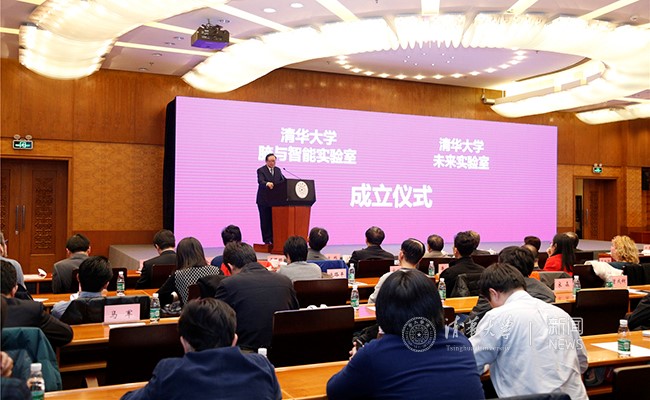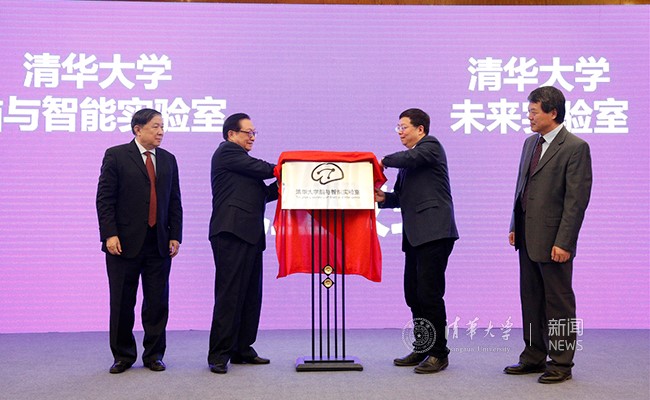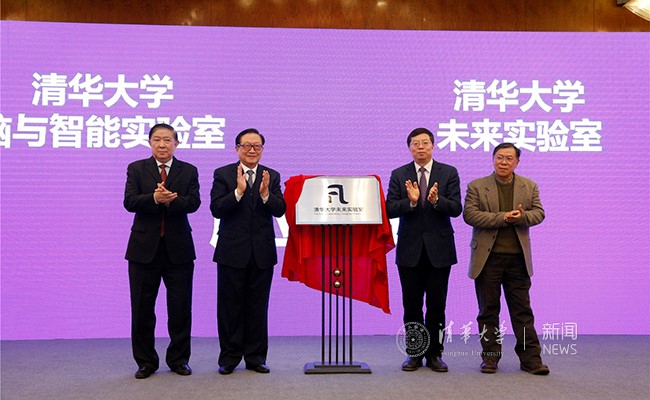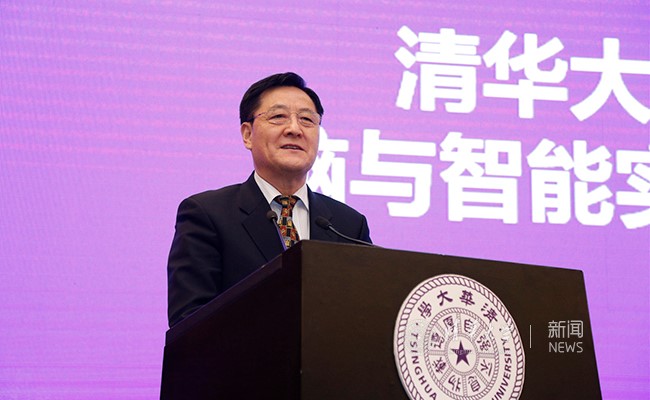The Tsinghua Laboratory of Brain and Intelligence and the Future Laboratory unveiled
On December 15th, the Tsinghua Laboratory of Brain and Intelligence (THBI) and the Future Laboratory, Tsinghua University (THFL), were officially unveiled. Among the attendees at the ceremony were Hua Jianmin, the Vice Chairman of the Standing Committee of the 11th National People’s Congress, former State Councilor and Secretary General of the State Council, as well as the Chairman of Tsinghua’s Committee of Strategic Development; Xu Guanhua, member of the Standing Committee of the 11th Chinese People’s Political Consultative Conference National Committee, former Minister of Science and Technology, member of the Chinese Academy of Sciences, and Chair of the Scientific Steering Committee of the Institute for Global Change Studies at Tsinghua; Wu Qidi, former Vice Minister of Education and Director of Tsinghua’s Center for Engineering Education; Zhang Jingan, former Secretary-General of the Ministry of Science and Technology, former Chief of the Science and Technology Daily, Deputy-Director of the Administration Committee of Institute for Culture Creativity, Tsinghua University; Professor Sir Keith Burnett, the President & Vice-Chancellor of the University of Sheffield, the President of Tsinghua University Qiu Yong, and the Vice President Xue Qikun.



Hua Jianmin extended his congratulations to Tsinghua in his speech, and emphasized the importance of interaction across academia, enterprises, and other social circles, and their deep integration. He noted that in the past three years, Tsinghua had proposed many important measures concerning reform and innovation. Especially in its promotion of interdisciplinarity, Tsinghua had made successful attempts at improving the management, cultural environment, supportive systems, and organization of interdisciplinary research, and had obtained fruitful results. The ACM Gordon Bell Prize Tsinghua has just won is a good example of the university’s achievements in this regard. He also hoped Tsinghua would take the establishment of these two labs as an opportunity, and attain outstanding results in the production of revolutionary technological innovations at the forefront of research. He hoped Tsinghua would support and contribute to the construction of an innovation-oriented country.

Xu Guanhua, Wu Qidi, and Zhang Jingan also congratulated Tsinghua on the unveiling of the two labs.



In his address, Qiu Yong noted that the establishment of the THBI and THFL is a landmark event in Tsinghua’s reform of the systems and mechanisms of scientific research, and a crucial measure to promote interdisciplinarity within the university. He also stated that innovation is the most important keyword of the 21st century, and to promote interdisciplinary research is key in obtaining high-level innovative results. The future development of innovation at Tsinghua demands great attention to interdisciplinarity. President Qiu hoped the two labs could produce results that truly represent the fruitful outcome of this innovation in the systems and mechanisms of scientific research at Tsinghua.

As a new measure to fully implement the national strategy of innovation-driven development, and to deepen the comprehensive reforms, including the reforms of the systems and mechanisms of scientific research carried out by Tsinghua, these two new interdisciplinary research institutes will target the forefront of science and technology, further promoting interdisciplinary research.
The THBI and THFL will look towards the future and nurture a richer culture for interdisciplinary research by pooling together wisdom from around the world. Through their revolutionary technological innovations these two labs aim to generate original results through interdisciplinary research, thereby better serving the requirements of major national strategies and the need for economic development, and leading progress in science and technology.

These two labs will cultivate as well as attract a group of leading scientific talents and researchers, and conduct interdisciplinary research in the vanguard of academia, with the aim of contributing to future developments in science and technology, and to providing strategic support for the construction of an innovation-oriented country.
The main research area of the THBI will be the interaction of systems and computational neuroscience, and artificial intelligence. The lab will gather top scholars from all over the world, and add momentum to interdisciplinary research in engineering, life sciences and medical research at Tsinghua, while promoting as well as leading the development of the interdisciplinarity of the university at large.
The main research directions of the THBI are: 1) to develop the next generation of key neuro-technologies in brain-computer interface, human-computer interaction and neural modulation; 2) to use engineering techniques and computational models to explore complex problems in the forefront of brain science, especially in frontier areas such as the neural mechanisms of speech and language, music perception and social interaction, the neural circuits of emotion and decision-making, and neuro-aesthetics; 3) to develop brain-inspired devices and systems and conduct theoretical work on general artificial intelligence systems. An important mission of the the laboratory is to train the next generation of researchers with dual training in engineering, mathematics and neuroscience.
Xu Yingqing, the Director of the THFL and Professor from the Academy of Arts & Design of Tsinghua, stated in his speech that “the THFL will build upon Tsinghua’s advantages in different disciplines and talent training, and realize multi-level intersections of science and technology, as well as arts and humanities. The THFL will aim to promote changes in the fields of human cognition, interaction and logic, and endeavor to explore the future of humanity and revolutionize our life and working style. It will incubate innovative technologies and emerging industries, thereby making the future tangible.” The lab will first conduct research in multi-channel cognition and interaction, future habitats, future health care, computational photography, emotional expression data collection and analysis, and affective computing. It will also expand its exploration to other areas, striving to lead innovation in technology.
(By Zhu Lvhe)

